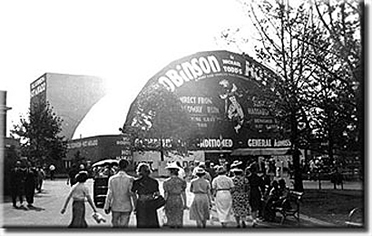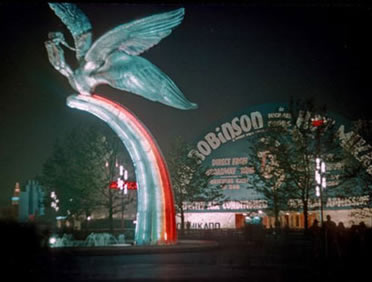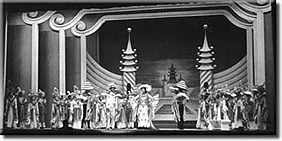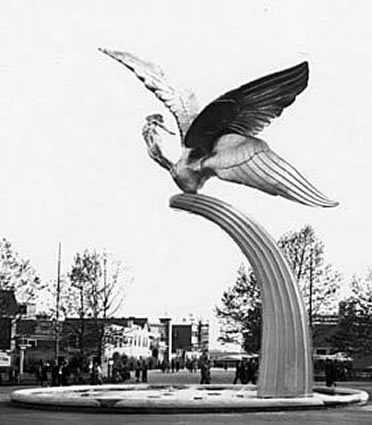Music Hall Page 2 
Read David Cope's Perisphere Ponderings on Bill Robinson and the Hot Mikado 

Eighteen-year-old Irving Young, a recent graduate Abraham Lincoln High school spent the summer in a Santa outfit advertising “The Hot Mikado.” The sign he wore stated: “I couldn’lt wait until Christmas to see The Hot Mikado.”
“Santas” were not welcome near the Soviet Building as he was informed they did not believe in Santa. One day at the GM building, a young boy snuck up and set the Santa whiskers aflame. He had to return to the Hall of Music to pick up a second pair.
Bill Robinson’ls gold pants cost $50.00 a pair and had to be replaced every two weeks.
The cast of “The Hot Mikado” presented “Hot” Harry James a new trumpet “In recognition of his torrid trumpeting.”
Minnesota native Mike Todd invited his home-state governor, Harold Stassen, to “The Hot Mikado.”
Workers installed an 11,000-square-foot banner over The Music Hall to announce “The Hot Mikado.” However, it was about a foot too long.
The spiel of the man who sold the opera glasses: “They make every seat a seat in the front row.” A gentleman bought a pair and proceeded to the front row seeking a seat.
The spiel of the show’ls barker: “Come in and see Bill Robinson dance, with his golden shoes and golden pants.”
In order to stimulate Fair attendance, the Fair’ls employees launched an effort to sell 600,000 tickets. Bill Robinson started the auction for the prime tickets.
Grover Whalen’ls son damaged Bill Robinson’ls Dusenberg, stripping its gears, while the two were discussing moving the Broadway hit to the Fair.
Every evening Bill Robinson left the final performance of “The Hot Mikado” to dance at The Cotton Club. A special car race him to the LIRR station. He was picked up at Penn Station at 12:45 A.M. and then taken to the club. It took twenty – five minutes for the nightly trip. One evening at The Cotton Club socialite Doris Duke Cromwell danced with Robinson, who had given her lessons a few years before.
The Fair celebrated Bill Robinson Day on August 25 on his sixty-first birthday. The National Cash Register Company wanted him to dance on top of their pavilion, but, insurance considerations canceled the plans. He placed his footprints in cement and accepted a scroll from Grover Whalen. Robinson then raced seventy-five yards backwards against four collegians running 100 yards frontwards.
Bill Robinson received a summons for disorderly conduct when a patrolman told him to move on at 47th Street and Broadway and he refused. Robinson was arraigned before Magistrate August Dreyer who dismissed the charges.
Robinson explained he was on his way to the Cotton Club and heard about a new animated electric sign featuring his dancing. He stopped to watch “Hot Spots from the Hot Mikado” and denied having said anything disrespectful to Patrolman Thomas Christian. When asked if he would have arrested Robinson if he knew who he was, Christian replied: “Certainly. Are celebrities any different from other people?”



Just outside the Music Hall standing in the area called "Times Square stood "To the Morrow " a sculpture by Gertrude Vanderbilt Whitney.
During 1939 a visitor could be entertained by Bill "Bo Jangles" Robinson and a cast of more than 200 other performers in Michael Todd's "Hot Mikado."

